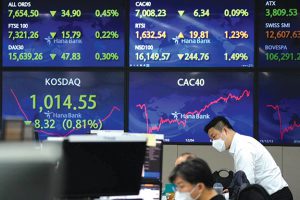Bloomberg
For equity investors in South Korea, this was the year the metaverse arrived.
Six of the nation’s 10 best-performing stocks in 2021 are linked to the virtual universe or non-fungible tokens, including Wemade Max Co, which has surged 1,500% as it seeks to be a blockchain game developer, and its top holder Wemade Co Virtual effects creator Giantstep Inc has soared over 1,200% since its March listing as day traders piled into metaverse-tied stocks and exchange-traded products.
Looking ahead, the metaverse — a virtual universe that blends various aspects of digital technologies, and NFTs — which record data ownership on blockchains, are expected to be widely adopted among online game developers, content creators and even K-pop agencies. Still, companies working in these state-of-the-art technology areas will need to show that their businesses are viable or face possible volatility.
“I’m bullish on the companies that are well-prepared for the NFT and metaverse businesses but some may come under pressure if they can’t back up their words with action,†said Sung Jonghwa, an analyst at eBEST Investment & Securities Co.
The broader South Korean stock market turned less euphoric in the second half of the year, owing to a more hawkish central bank, Covid-19’s spread and curbs on margin trading. The benchmark Kospi — the world’s top performer among major national gauges in 2020 — shot above 3,000 for the first time early in 2021 but has wiped out most of this year’s gains. Still, its advance of about 5% compares with a 3% drop in the MSCI Asia Pacific Index.
Retail investors this quarter began to sell equities for the first time since the pandemic started, as their favourites including 2020’s star performers Shin Poong Pharmaceutical
Co and Celltrion Inc reversed direction and plunged.
Foreign funds are poised to be the largest net sellers of Kospi shares this year since the 2008 financial crisis. They’ve dumped about $42 billion worth in 2020 and 2021 combined.
Its rally started when biggest shareholder Wemade launched globally the fourth installment of the ‘Legend of Mir’, which allows online players to convert in-game assets into tradable crypto coins. In November, Wemade Max surged by daily limit after it announced a stock swap to make Mir4’s developer Wemade Next Co a wholly-owned unit. The company now has a market cap of about $615 million.
The stock’s wild ride, however, caught the bourse operator’s attention. Korea Exchange asked investors to be cautious, placing it on the list of stocks that weren’t open for margin trading effective December 16 until further notice. “It is such a tiny-cap stock that surged on expectations that it would benefit from Wemade’s expansion into the metaverse,†said Billionfold’s An. “But the link is not strong.â€
Listed on the country’s smaller Kosdaq in March, Seoul-based firm’s stock has surged amid the metaverse boom. The firm collaborated with K-pop agencies including SM Entertainment Co. to create virtual avatars of Korean music stars, and it’s also working with boy band BTS’s
entertainment agency Hybe Co.
“This is the metaverse meme stock,†said An. “It’s not clear if the stock’s rally can be justified.â€
In addition to the huge global success of its cult crypto-mining game ‘Mir4’, the firm was also buoyed by its pledge to put non-fungible tokens at the center of its strategy to build its Wemix blockchain gaming platform. “It is one of the most highly anticipated companies with best insight,†said eBEST analyst Sung.
The developer of Covid-19 treatment saw its market value shrink from as much as $6.4 billion in January to just $1.4 billion this month as the company failed to secure meaningful statistical data from stage 2 clinical trials to use its malaria drug Pyramax to fight the coronavirus. The stock skyrocketed 1,600% in 2020.
This is another pharmaceutical firm that failed to sustain the high hopes for Covid-19 treatment after the stock jumped more than 100% last year. Its quarterly revenues and earnings sank from a year ago, while sales of its Covid-19 antibody treatment Rekirona remained slow. The development of oral Covid-19 pill by global drug makers such as Pfizer Inc. also pressured the stock.
While SK Bioscience Co. was the top gainer among major initial public offerings worldwide this year, its parent SK Chemicals, which has a 68.43% stake in the AstraZeneca vaccine producer, lost out. Investors didn’t like that its core vaccine business was spun off, and the subsidiary’s IPO prompted Singapore-based hedge fund Metrica Partners Pte. to urge SK Chemicals to address the share decline.
 The Gulf Time Newspaper One of the finest business newspapers in the UAE brought to you by our professional writers and editors.
The Gulf Time Newspaper One of the finest business newspapers in the UAE brought to you by our professional writers and editors.
